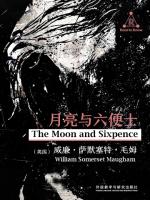A Book Review on “The Moon and Sixpence”
The Moon and Sixpence is a novel written by the prominent English writer William Somerset Maugham. Published in 1919, the book tells a story of a stockbroker named Charles Strickland who gives up his decent life and pursue his passion of painting. The novel provides a vivid portrayal of the mentality of a genius and gives its readers inspiration to really consider about the true meaning of life.
Charles Strickland, the hero of the novel, leads a peaceful life with his wife and children as a conventional stockbroker in London. Their lives are so honest and decent that one will hold the belief that their lives cannot be troubled by any untoward adventure. However, unexpectedly, Strickland abandons his wife and children for Paris to live his life as a painter. In the eye of his closest friends, he is quite selfish, thankless and brutal. When asked about his wife, “Don’t you care for her anymore?”, he simply replies with indifference, “Not a bit.” And although he ruins by a ruthless chance the peaceful and cozy life of a friend who has helped him greatly, he shows no sympathy or shame for him. And another thing very eccentric about him is that he doesn’t mind what people think of him at all and so convention has no hold on him.
Strickland gives up all he had simply out of the desire to create beauty. He rather wanted to be a painter when he was a boy, but his father made him go into business because he thought there was no money in art. But the passion to be a painter stays in his body all the time, just like a sleepy monster inside, and one day that monster is bound to wake up and break through the cage. The passion that holds him is a passion to create beauty, to depict the mysterious mental world inside him through painting. His desire for beauty is so great that to attain it he will shatter the very foundation of his original life.
After years of drifting in poverty in Paris, Strickland finally arrives in Tahiti and at first sight of Tahiti he feels that it is the place he’s been looking for all his life. In Tahiti the circumstances are rather favorable to him; he finds in his surroundings the accidents necessary for his inspiration to become effective which he failed to find in England nor in Paris. Far away from civilization, Tahiti is peaceful, wild and primitive. This place has some kind of magic that makes some people extremely unwanted to leave once they take their first step on this island. Here Strickland marries a native girl called Ata and they have two children and live in a place which has the beauty of the Garden of Eden. He is still a queer fish in the eye of people in Tahiti, but they are so used to eccentrics that they take him for granted. It is the place where he can truly be himself, and it is the place where many other people can truly be what they want to be, instead of what they must be.
In Tahiti, Strickland finishes his final and most thrilling work, a huge painting on the walls. In this painting are a great primeval forest and naked people walking beneath the trees. Anyone who see the painting is bound to be extraordinarily affected. It is tremendous, sensual, passionate, but horrible too. It’s as if Strickland had delved into the hidden depths of nature and discovered secrets which were both beautiful and fearful. The things one can feel in this painting are quite primitive and go straightly deep into the very depths of human heart and nature and that makes him tremble. This is what Strickland truly desire to present and that he can leave the world without any regret. Strickland catch leprosy and he faces it with peace and he keeps painting until the last minute of his life.
The book is quite magnificent, and my mind lingers for a long time after reading those excellent chapters about Strickland’s life in Tahiti. Though there is something too dramatic and exaggerated in Strickland’s experience, the story is indeed inspiring. Sometimes we may be overly inhibited by the mirror self of us but neglect the inner self. The mirror self is the image of us which we form by observing others’ reactions to our behaviors. At times we are just trying to be the people that we must be, or people tell us to be, not the people we want to be. In the book Maugham tells a story of another man named Abraham. Abraham has remarkable gifts and a coveted job. But he gives up all he had right after a vacation to Alexandria. He occupies a very modest position and lives in the city for the rest of his life. When asked if he was regretted for his choice, he said that he wasn’t regretted for a minute and he thought he had a wonderful life. Other people certainly think that Abraham is crazy and he has made a hash of life. But I suppose that the meaning of life is not to be simply judged by material things such as money and position that almost everyone wants. Just as the saying goes, “Not everything that counts can be counted and not everything that’s counted truly counts.” The greatness in Strickland’s artworks is rarely appreciated by people when he is alive. But he knows very well that what he really wants isn’t reputation and recognition from others, but to successfully express his mental inner world by painting. Life is a matter which is worth carefully considering, and I hope all the readers who have read this book can think deeply about the meaning they attach to life and lead the kind of life they truly want.



 京公网安备 11010802032529号
京公网安备 11010802032529号